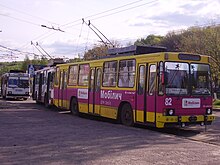PA Pivdenmash
 Zenit-2 rocket ready for launch at Baikonur. | |
| Agency overview | |
|---|---|
| Formed | 1944 |
| Headquarters | Dnipropetrovsk, Ukraine |
| Employees | 13.000 |
| Website | http://www.yuzhmash.com |
The A.M. Makarov Southern Machine-Building Plant, or PA Yuzhmash (Template:Lang-uk; Template:Lang-ru; literally: Production Union Southern Machine-Building Plant named after A.M. Makarov) is a Ukrainian manufacturer of space rockets, satellites, agricultural equipment, buses, trolley buses, trams, and wind turbines that was inherited from the Soviet Union. It is a large state-owned company located in Dnipropetrovsk.
Yuzhmash is a Russian portmanteau that stands for Southern Machines.
History
Yuzhmash operated initially as "plant 586" in the Soviet Union. In 1954 Mikhail Yangel established the autonomous design bureau designated OKB-586, from the former chief designer's division of plant 586. Yangel had previously headed OKB-1 (today RKK Energiya) and was primarily a supporter of liquid fuel technology – unlike Sergei Korolev at OKB-1, who was a supporter of missiles using cryogenic fuels. To pursue development of ballistic missiles using storable liquid fuels, Mikhail Yangel had received authorization to convert the chief designer's division of the plant into an autonomous design bureau. Following this, OKB-586 was designated Southern Design Bureau (better known as Yuzhnoye) and plant 586 was renamed Southern Machine-Building Plant in 1966, with an focus on the design and production of ballistic missiles. The plant was later renamed Southern Machine-Building Production Union, or Yuzhmash.
Missiles produced at Yuzhmash included the first nuclear armed Soviet rocket R-5M (SS-3 'Shyster'), the R-12 Dvina (SS-4 'Sandal'), the R-14 Chusovaya (SS-5 'Skean'), the first widely deployed Soviet ICBM R-16 (SS-7 'Saddler'), the R-36 (SS-9 'Scarp'), the MR-UR-100 Sotka (SS-17 'Spanker'), and the R-36M (SS-18 'Satan'). During the Soviet era, the plant was capable of producing of up to 120 ICBMs a year. In the late 1980s, Yuzhmash was selected to be the main production facility of the RT-2PM2 Topol-M ICBM (SS-27 "Sickle B").

After the beginning of perestroika, demand for military production declined significantly, and the Yuzhmash product line was expanded to include non-military uses such as civilian machinery.
One line of products added after 1992 are trolleybuses. Models include the articulated YuMZ T1 (1992–1998[citation needed]) and its non-articulated brother, the YuMZ T2. The T2 continues[when?] to be produced alongside the more modern YuMZ E-186 which features a low floor cabin.[citation needed]
Leonid Kuchma, long-time[when?] chief manager of the company, became the Prime Minister[when?], and later President of Ukraine in 1994.
Today

In addition to production facilities in Dnipropetrovsk, Pivdenne Production Association includes the Pavlohrad Mechanical Plant, which specialized in producing solid-fuel missiles. Pivdenmash's importance was further bolstered by its links to Ukraine's former President Leonid Kuchma, who worked at Pivdenmash between 1975 and 1992. He was the plant's general director from 1986 to 1991.[citation needed]
In February 2015, following a year of strained relations as a result of a Russian military intervention into Ukraine, Russia announced that it would sever its "joint program with Ukraine to launch Dnepr rockets and [was] no longer interested in buying Ukrainian Zenit boosters, deepening problems for [Ukraine's] space program and its struggling Yuzhmash factory."[1]
The firm imposed a two month unpaid vacation on its workers in January 2015. With the loss of Russian business the only hope for the company was increased international business which seemed unlikely in the time frame available. Bankruptcy seemed certain as of February 2015.[2]
Products
This section needs expansion. You can help by adding to it. (September 2012) |
The company had been the key missile producer for Soviet ICBM and space exploration programs. Historic and Yuzhmash launch systems included:
Missiles
- the R-5M - the Soviet Union's first nuclear armed missile
- the R-12 Dvina theatre ballistic missile
- the R-14 Chusovaya theatre ballistic missile
- the R-16 - the first widely deployed ICBM of the Soviet Union
- the R-36 (8K67) ICBM
- the RT-20, the first mobile ICBM (not deployed)
- the R-36orb, the first ICBM with orbital warhead (not deployed)
- the R-36M ICBM family (converted to Dnepr rocket)
- the MR-UR-100 ICBM family
- the 15A11 missile for Perimetr system
- the RT-23 Molodets ICBM family
Space Launch Vehicles
- Kosmos (rocket family)
- Dnepr-1
- Tsyklon (based on R-36/8K67)
- Zenit (rocket family)
- Boosters for Energia (based on Zenit first stage)
See also
- Yuzhnoe Design Bureau - a major missile designer closely co-operating with Yuzhmash
- National Space Agency of Ukraine
External links
- English-language home page
- Makarov Pivdennyy (Yuzhnyy) Machine-Building Plant at the Nuclear Threat Initiative
References
- ^ Messier, Doug (6 February 2015). "Russia Severing Ties With Ukraine on Dnepr, Zenit Launch Programs". Parabolic Arc. Retrieved 8 February 2015.
- ^ Doug Messier (February 10, 2015). "Ukraine Space Industry on Verge of Collapse". Parabolic Arc. Retrieved February 14, 2015.
